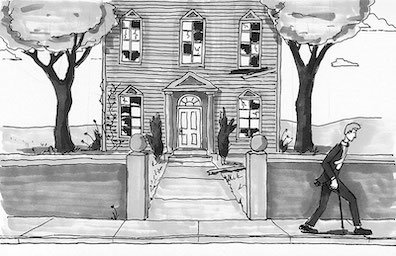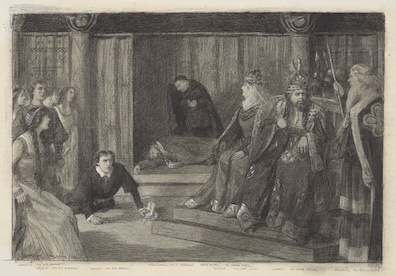As the funeral
carriage nears its destination, Mr. Powers points out "The last
house" before the cemetery grounds: "That is where Childs was
murdered." The men in the carriage discuss the 1899 trial and
acquittal of Childs's brother Samuel, Martin Cunningham voicing
the legal principle that it is better for 99 guilty people to
escape justice than for one innocent person to be wrongly
condemned:
They looked. Murderer's ground. It passed darkly.
Shuttered, tenantless, unweeded garden. Whole place gone
to hell. Wrongfully condemned. Murder. The murderer's
image in the eye of the murdered. They love reading about it.
Man's head found in a garden. Her clothing consisted
of. How she met her death. Recent outrage. The weapon used. Murderer
is still at large. Clues. A shoelace. The body to be
exhumed. Murder will out.
As the third-person narration that begins this passage gives way
to interior monologue, Bloom repeats two words from the
soliloquy in which Hamlet laments that his entire world has, in
Bloom's words, "gone to hell": "Fie on't, ah fie!
'tis an
unweeded garden / that grows to seed, things rank and
gross in nature / Possess it merely" (1.2.135-37). Hamlet is
brooding on his father's sudden death and his mother's
remarriage to the king's brother, a gross specimen of humanity
"no more like my father / Than I to Hercules" (152-53). An
overgrown garden expresses this decline from Edenic perfection.
The phrase "unweeded garden" is probably no accidental echo
(Bloom knows
Hamlet, and this is one of its famous
lines), but does it allude to the play in any significant way?
Bloom is thinking about murder, but Hamlet presumably is not,
because he has not yet learned how his father died. When Joyce
echoes other texts, however, readers who look for deeper
connections are often rewarded. The man accused of murdering
Thomas Childs was his younger brother, and before act 1 is over
Hamlet learns that his father's younger brother murdered him to
seize his patrimony. Hamlet's soliloquy all but predicts this
revelation, and when he learns from the ghost that "The serpent
that did sting thy father's life / Now wears his crown," he
exclaims, "O my prophetic soul!" (1.5.39-40).
The structural analogy of murderous younger brothers lurks
beneath the surface of Joyce's text, but various phrases in the
text point to it. The newspaper staple "
Murderer is still at
large" is a five-word encapsulation of the charge that the
ghost gives Hamlet. The "
unweeded garden" of Childs's
house recalls the poisoning that took place while King Hamlet
was "
Sleeping within my orchard" (1.5.59). An orchard is
a garden, as Shakespeare makes clear when Hamlet tells Claudius
about the fictional killer of a king in his mousetrap play: "
'A
poisons him i' th' garden for his estate"
(3.2.261). Lurid newspaper details like "
Man's head found in
a garden" are no more sensational than the horrifying
account of bodily dissolution that the ghost imparts to Hamlet.
Finally, the old proverb that "
Murder will out" may, as
Gifford suggests, recall Hamlet's rationale for staging a play
within the play: "
For murther, though it have no tongue, will
speak / With most miraculous organ" (2.2.593-94).
It is hard to say how many, if any, of these analogues to the
murder of King Hamlet may actually occur to Bloom, as opposed to
simply being thrown in his way by the author, but their
cumulative effect is certainly to overlay one murder on another.
The allusion to Ophelia is opposite. It occurs in a single,
highly uncertain sentence, but one can easily imagine Bloom
thinking it, since he has already
reflected on Ophelia's suicide
in
Lotus Eaters. Bloom is grateful when Martin
Cunningham tamps down the harsh judgments of suicide from Jack
Power and Simon Dedalus:
Sympathetic human man he is. Intelligent. Like
Shakespeare's face. Always a good word to say. They have no
mercy on that here or infanticide. Refuse christian burial.
They used to drive a stake of wood through his heart in the
grave. As if it wasn't broken already. Yet sometimes they
repent too late. Found in the riverbed clutching rushes.
The image that concludes these sentences seems to derive at
least in part from canto 5 of
Dante's
Purgatorio, in which two people in the circle of
the Late Repentant describe how they died at water's edge, one
of them "entrapped in reeds / and mire," the other swept
downstream by a flood and deposited at the muddy bottom of the
Arno. It is not clear why Bloom thinks, "Yet sometimes they
repent too late," but this detail applies well to Jaccopo and
Buonconte, and not at all to Ophelia. Despite the almost certain
presence of Dante in the image, though, it seems that Joyce may
also have had Shakespeare in mind, because Ophelia too was
"Found in the riverbed" clutching vegetation.
Queen Gertrude tells Laertes that his sister drowned in a
"brook." She was weaving "fantastic garlands" out of
wildflowers, and as she strained to hang them on the boughs of a
willow tree overhanging the river, a branch broke. She fell in
still holding her flowers, floated for a while "As one incapable
of her own distress," until her waterlogged clothes "Pull'd the
poor wretch from her melodious lay / To muddy death"
(4.7.166-83).
Gertrude's speech feels like a jewel of ekphrastic verse (it has
inspired many paintings), but it can hardly be an honest
account. If she watched all these things happening, why did she
not intervene to save Ophelia's life? The following scene
suggests why Gertrude might have invented a false story. The
first gravedigger asks why Ophelia is receiving a Christian
burial if she committed suicide, and the second one says that
the coroner has made that ruling (5.1.1-5). Later in the same
scene, Laertes sees someone being buried with "maimed rites" and
infers "The corse they follow did with desp'rate hand / Fordo it
own life" (219-21). The priest escorting the body says that "her
death was doubtful, / And but that great command o'ersways the
order, / She should in ground unsanctified been lodg'd / Till
the last trumpet" (227-30).
It appears, then, that the miserable Ophelia threw herself
into a stream and met an ugly, "muddy death." Bloom's image of
a corpse "Found in the riverbed clutching rushes" is
probably a much more accurate account than the picture that
Gertrude paints of Ophelia clutching pretty flowers. But the
queen's fiction is calculated to spare Laertes' feelings. Like
Martin Cunningham she is "Sympathetic." She shows "mercy,"
finds "a good word to say." Bloom supposes Shakespeare to have
been this kind of man, capable of valuing human suffering over
religious doctrines.




